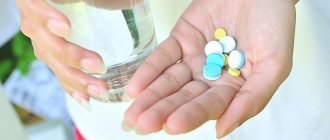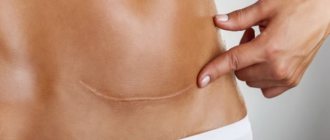A symptom such as nausea after eating is not a separate disease; in most cases, it signals acute or chronic disturbances in the smooth functioning of the human body. Attacks of nausea vary from minor and quickly passing to painful, exhausting, ending with uncontrollable vomiting.
In order to make a correct diagnosis, you need to analyze the accompanying symptoms and conduct laboratory and instrumental studies. All these manipulations are carried out by a doctor in a medical facility. The information provided in the article is not a reason for self-diagnosis and self-medication, but is provided for informational purposes.
Causes of nausea
Nausea can be caused by gastrointestinal diseases.
Nausea can occur as a symptom of a disease, or as a result of certain conditions that cannot be called a disease. The main causes of nausea after eating can be:
- Gastrointestinal diseases (gastritis, gastric and duodenal ulcers, duodenitis, pancreatitis, cholecystitis).
- Problems with the vestibular system.
- Toxicosis of pregnancy.
- Poisoning with low-quality products, intestinal infection.
- Side effects, drug overdose.
- Development of cancer.
- Infection with worms.
- Unhealthy nutrition (overeating, preference for fatty or sweet foods, dieting, fasting).
- Emotional outbursts, severe stress.
- Allergic reaction to certain foods.
There are many other causes of nausea, but in most cases they are not related to food intake. This could be a migraine, an attack of appendicitis, a concussion, a pre-infarction condition, hypertension, dehydration, heat and sunstroke, etc.
Vomiting an hour after eating
Vomiting that occurs such a short time after eating can signal diseases of the gastrointestinal tract such as pancreatitis, cholecystitis, and cirrhosis of the liver. These pathologies are often accompanied by bloating, belching, and lack of appetite.
When you feel sick due to gastrointestinal problems
If you have abdominal pain, you should contact a gastroenterologist.
Gastrointestinal diseases play a leading role in the symptoms of nausea after eating. With gastritis and peptic ulcers, the feeling of nausea is accompanied by heaviness and a feeling of fullness after eating. A burning sensation occurs in the epigastric region, which is felt both after eating and on an empty stomach.
If there is a suspicion of such a pathology, the gastroenterologist will prescribe laboratory tests for the notorious Helicobacter pylori, general and biochemical blood tests. You will definitely need gastroscopy, which is the most informative diagnostic method today.
Nausea associated with a disease such as cholecystitis (inflammation of the gallbladder), or with dyskinesia, can be combined with pain in the right hypochondrium, the appearance of bitterness or a metallic taste in the mouth, and flatulence. Unpleasant nausea appears not only after eating, but also during eating. The diagnosis is clarified by ultrasound of the gallbladder and liver; treatment can be either medicinal or surgical.
If the cause of nausea is gastroduodenitis, then additional symptoms appear such as belching, heartburn, a feeling of a lump in the throat, pain in the pit of the stomach. Nausea after eating is felt mainly in the evening, and in the morning, on the contrary, it occurs on an empty stomach. To relieve this condition, it is necessary to review the diet (coffee, chocolate, carbonated drinks, spicy and fatty foods are excluded from it), diet, and undergo drug therapy aimed at normalizing the acid balance and improving motility of the stomach and intestines.
Treatment of stomach discomfort
What to do if you have stomach discomfort?
To alleviate the condition you may need:
- diet;
- assistance with medicines.
To learn more
If discomfort or heaviness in the abdomen is associated with a lack of digestive enzymes, then taking enzyme preparations may be necessary. These drugs support digestion by delivering the same enzymes from the outside. Creon® is available in capsule form and is suitable for this task. The Creon® capsule quickly dissolves in the stomach, releasing hundreds of small particles - minimicrospheres1. Due to their small size, they evenly cover the food in the stomach to help in the digestion of its volume. This helps the body obtain the necessary nutrients from food and cope with symptoms such as heaviness and discomfort in the abdomen, bloating, and gurgling. This mechanism of action distinguishes Creon® from similar drugs in tablet form.
A tablet is an indivisible form of release that cannot be properly mixed with food in the stomach, and therefore cannot help in its complete digestion. The idea that a tablet can be crushed is erroneous, since this will lead to a breakdown of the protective coating of the drug, and the enzyme will simply die in the stomach.
You can find out more about the differences between Creon® and other drugs here.
In the fight against heaviness or discomfort, as a rule, 1 capsule of Creon® 100001 helps. Creon® capsules are easy to use: if necessary, you can open them and mix minimicrospheres with food or juice1. This way you can individually select the dose, which is especially important for young children, for whom Creon® is approved from birth1.
Pancreatitis – focus on the pancreas
Particular attention should be paid to such a pathology, accompanied by nausea after eating, as pancreatitis. It is accompanied by bloating, acute girdling pain radiating to the back and right hypochondrium, intestinal upset, and sudden weight loss. The diagnosis of this pathology can be made based on the results of ultrasound and laboratory tests for sugar, the presence of enzymes, and determination of the inflammatory process. Treatment of pancreatitis is associated with long-term diet, drug therapy with enzymatic and anti-inflammatory drugs.
Digesting food is hard work for the body.
Digestion of food
It was tasty and interesting for you, but for the body the process of digesting food is hard work. Although food is crushed in the mouth, it can stick together into a dense lump in the stomach. Blood actively flows to the digestive organs, while other organs begin to experience a lack of oxygen.
Additionally, pressure in the small intestine increases, and the production of catecholamines - mediators and hormones that are involved in metabolism - is activated. This causes weakness and sometimes nausea.
A common occurrence is drowsiness after eating. This effect is associated with changes in blood glucose levels. If you have risen, we are happy, energy is in full swing and we want to live. If it has decreased, then we want to sleep or just lie idle.
Or maybe it's poisoning or an intestinal infection?
When poisoned, a person feels weak and has a fever.
In this case, vomiting begins a short time after eating poor quality food, this process always ends with vomiting. Thus, the body tries to free itself from the source of intoxication, adding diarrhea to nausea and vomiting.
Toxins cause weakness, headache, and fever. Abdominal pain in the area of the stomach and intestines; after 1-2 days, symptoms of dehydration increase:
- Thirst
- Dry skin and mucous membranes
- Dizziness
- Rare urination
- Weight loss, gaunt appearance
If you induce vomiting after the first attacks of nausea, you can avoid most of these symptoms by getting rid of the source of the poisoning. Be sure to take absorbents (Polyphepan, activated carbon) and drink plenty of fluids. If the condition worsens, and in children even if initial symptoms appear, be sure to seek medical help. With an intestinal infection, vomiting can become uncontrollable, bile appears in it, and dizziness can be felt.
Nausea during pregnancy
Nausea during pregnancy can be caused by toxicosis.
Both early and late toxicosis of pregnancy can be accompanied by nausea. This symptom is present for a short time, it appears most often in the morning, or accompanies selective aversion to certain odors (for example, the smell of meat broth).
Very rarely, such a symptom accompanies pregnancy for many months; in such cases, hospital treatment must be carried out to avoid the occurrence of pathologies in the fetus. You can cope with early toxicosis if in the morning, without getting out of bed, have breakfast with a small amount of fruits or nuts, drink tea with mint and crackers.
Late toxicosis, or gestosis, is a more dangerous condition than early toxicosis. With gestosis, nausea and vomiting are accompanied by swelling, increased blood pressure, and the flickering of “flies” before the eyes. This indicates damage to the nervous and urinary systems, which can result in eclampsia and even a threat to the life of the mother and child. That is why such symptoms should never be ignored in late pregnancy.
What to do if you feel sick in the morning
It is important to understand that regular morning sickness is a signal of the presence of a pathology or disease and self-medication is highly undesirable. Be sure to consult a doctor for an examination, but if you do not have such an opportunity at the moment, there are several effective ways that will help reduce or temporarily get rid of this problem:
- Medicines. You need to be very careful and you must be sure that morning sickness is not the cause of pregnancy or an intestinal disease.
- Drinks made from ginger root, mint and lemon. You can make infusions of these products for maximum effect by simply adding them to a glass and pouring boiling water, after 15 minutes you will have a very effective and safe (in the absence of allergies) remedy for morning sickness. YOU can also just add them to hot tea.
- Medicinal collection - if nausea persists in the morning, you can try a collection of mint, oak bark and celandine. To prepare the drink, take 1 teaspoon of mint leaves, dried oak bark and crushed celandine, pour 0.5 liters of boiling water and boil in a water bath for 10 minutes. After the broth is cooled and filtered, take 1 tbsp 3-5 times a day before meals.
- During pregnancy. There are little tricks you can use. For example, do not get out of bed quickly, drink plenty of fluids. Eliminate fatty and heavy foods from your diet. Eat small meals several times a day.
Side effects of medications
Nausea can be a side effect of taking antibiotics.
Unfortunately, sometimes taking vital medications can be accompanied by side effects such as nausea. Most often these are drugs from pharmaceutical groups such as:
- Vitamins
- Antidepressants
- Antibiotics
- Iron supplements
- Anti-flu drugs
- Anti-inflammatory drugs
In order to minimize discomfort, you must carefully observe the dosage, method of use, storage conditions, and expiration dates of the medications.
Dysfunction of the vestibular apparatus as a cause of nausea after eating
Seasickness can occur due to problems with the vestibular system.
“Seasickness” accompanies not only passengers of ocean liners, but also travelers on airplanes and road transport, especially if the cabin is hot and stuffy, and the passengers ate quite heavily before the trip.
This condition is caused by problems with the vestibular apparatus. Most often they occur in children, continuing until the end of puberty, but sometimes they also appear in adulthood, being a congenital feature of the body.
Nausea in this case can be prevented if you take medications like Aeromore before the trip, try to sit so as to look ahead, and do not eat before the trip. Sucking on a slice of lemon or a piece of ginger root, which is recommended to be kept under the tongue, is considered effective.
Dietary disorders
Attacks of nausea can occur because the intervals between meals are unreasonably long, and a feeling of hunger sets in. If you eat something sweet on an empty stomach, the nausea may not stop, but may intensify even more. The same sensations can be obtained from overeating and excessive consumption of sweets and baked goods.
Adherents of extreme diets, in their desire to lose excess weight, can go to extremes, reducing portions to a minimum, or spending fasting days without food at all. The most optimal method is split meals in small portions, fasting days under the guidance of a nutritionist.








